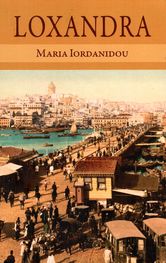
Maria Iordanidou
Loxandra
Translated by Norma Aynsley Sourmeli
Loxandra of ‘big arched feet and slim ankles‘, of ‘big hands like those of a patriarch...hands for kissing, fingers long and shapely, made to bless and to smell of mahlepi and incense, hands made for giving’, was born, it is said, in the times of Abdül-Medjid I, the 31st Sultan of the Ottoman Empire, who reigned from 1839 to 1861.
Life for the Greeks of Constantinople was relatively untroubled then. The 19th century was the time of reforms which established, on paper at least, the freedom of belief and equality of all citizens of the Empire before the law. Greeks were able to avoid conscription into the Ottoman army by paying a moderate tax, their merchants and craftsmen continued to ply their trades, and business between East and West moved along good-naturedly enough.
The 19th century was also marked by a period of rising nationalism in the Balkans but Loxandra was only partially aware of external events that did not immediately intrude on her life. Her life was centred on caring for her extended family. Brought up in the Anatolian tradition of love of good food, culinary delights flowed from her hands and her kitchen as from the horn of plenty and her generosity and enthusiasm for life and food was not confined solely to her family but spilled over to whomsoever she had contact with. However, Loxandra is not simply a story about Loxandra herself: more it is an evocation of an epoch — its historical events, the spirit of those times, the customs, life in that ‘Queen of Cities’ — a background against which the irrepressible Loxandra, almost larger than life, sailed like ‘an armed frigate before the wind’.
The Greek edition of Loxandra, first published in 1963, has been perhaps the most acclaimed popular publication in Greece of the 20th century and has remained continuously in print.
This first English edition includes extensive endnotes on contemporary events and traditions, and a glossary.
‘If you want to know what Istanbul was like at the turn of the twentieth century, read Loxandra. Maria Iordanidou’s novel, translated into English for the first time, effortlessly recounts the rhythms and ways of life in the city long past. First published in 1963, the book was so popular in Greek that it has been reissued ten times and was made into a television series in 1980, eventually bestowing Iordanidou with two of the highest honours in Greek literature: the Gold Cross and Lady of the Ecumenical Throne. . . . It is a novel about nostalgia, largely undisturbed by the political changes of the Tanzimât period, when the minorities in the Ottoman Empire were granted rights that made them equal to Muslim subjects. That is not to say that the massacres in Anatolia and Greece go unnoticed: the 1822 Chios Massacre, the massacres of Armenians in 1894–6 and 1909 in Adana, the Russo-Turkish War of 1877–8 and the 1890 uprisings in Crete are among the events mentioned throughout the book, briefly disturbing the firmament of the protagonist’s domestic life. These events are helpfully contextualized by through footnotes, endnotes and a glossary. The translation’s tone, inspired by Sourmeli’s grandparents’ Geordie dialect, rings true to the original book so that it feels like we are still being told a folk story at grandmother’s knee.’ Maria Eliades, in The Times Literary Supplement (9 March 2018).
The cover illustration is a photograph of Galata Bridge, Constantinople, and view of Pera with Galata Tower on the horizon, ca. 1895.
- 264 pages, 25.0 x 13.0 cm, Denise Harvey (Publisher), 2017